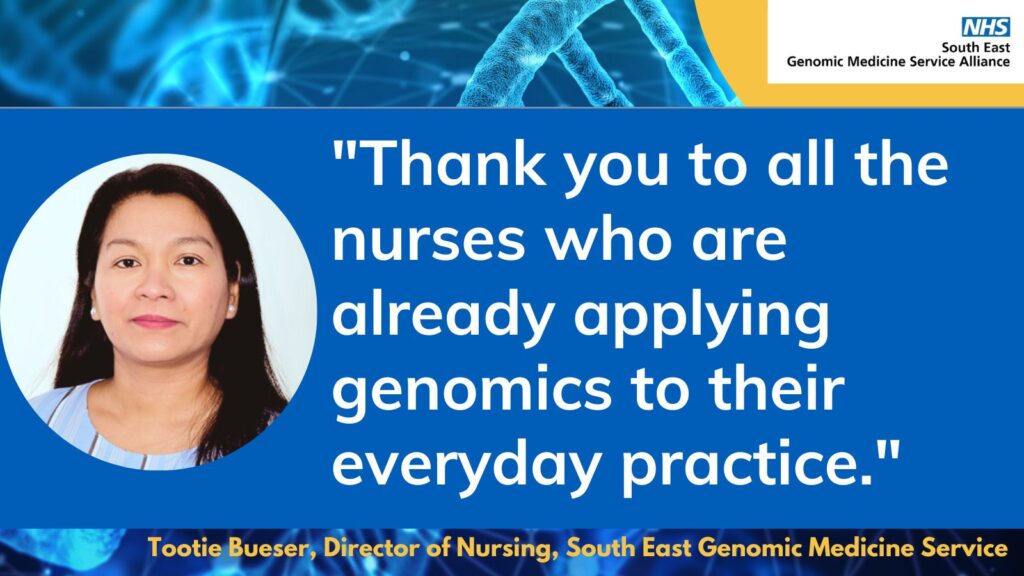
Nurses are involved in every aspect of our care. They make a tremendous difference to our lives and those of our families. What would we do without them?!
There are over 700,000 registered nurses working in the UK right now and many of them are already working in the world of genomics. It’s often a nurse who will chat with patients about their family history and pick up on the possibility of an inherited condition. Nurses regularly raise questions about the possibility of that patient having a genomic referral.
Following the creation of the NHS Genomic Medicine service, Genomics is becoming a greater part of nursing practice. More and more nurses are ordering genomic tests and supporting the counselling of patients on the results.
Thanks to nurses, thousands of people have now benefited from genomic testing which has enabled them to get an accurate diagnosis. That diagnosis then means they can receive the precise treatment and medication that they need. The results can be transformational for a person and their family.
Liz had an unexplained cardiac arrest at just 48 years old. She was under the care of Katie Frampton, who is an Inherited Cardiac Condition Nurse at St. George’s Hospital. Liz says:
“Katie was like a ray of hope. She told me that there might be a genetic cause for my condition which I found hugely comforting. Meeting Katie, and getting the genetic test, has changed my life and saved my daughters. I can’t thank her enough.”
Just like Liz, we want to celebrate nurses today on International Day of the Nurse.
Thank you to all the nurses who are already applying genomics to their everyday practice.
You can get involved too.
Ed Lee is a Renal Clinical Nurse Specialist and he is helping to demystify genomics for nurses and doctors across the South East. By working with fellow renal nurses, they have doubled the number of people who are benefitting from genetic testing for inherited kidney conditions.
Ed told us that people who have kidney dialysis often get to know their nurses very well because they are in hospital so often. This means that it is usually the nurses who uncover a family history of renal conditions. Ed wants to encourage more nurses to think about genomics.
“Even patients with end stage renal disease can benefit from genomics. Understanding if there is a genetic cause for their condition is so important for their care.
Ed is looking to set up a network of renal nurses across the South East. Get in touch and get involved.
Nurses leading the way for neurology patients
Here in the South East, we have several nurses who are leading the way in genomics. One example is Mark Mencias who is a neurogenetic clinical nurse specialist. Based at St. George’s Hospital, Mark is one of just four of his kind across the whole country!
Patients are referred to Mark by Doctors when they suspect that their neurological condition might have a genetic cause. Mark will arrange genetic testing which can offer an accurate diagnosis and open the door to new precision treatments for their condition.
Mark wants to encourage more nurses to embrace genomics.
“Genomics is the future. If you’re a nurse, get involved and learn how genomics can help you and your patients. My patients are already benefiting, and yours can too.”
We can help you to put genomics into practice
The Director of Nursing & Midwifery for genomics in the South East, Tootie Beuser summed it up when she told us. “If you are a nurse, genomics will undoubtedly be relevant to you, your patients and their families. Please do consider where genomics could fit in your practice.”
The team here at the South East Genomic Medicine Service can support you to set up pathways and educate staff teams. We’d love to hear from you and understand what you need to help put genomics into your practice.
We have a series of education and training sessions for you. Check out our website for the details.
